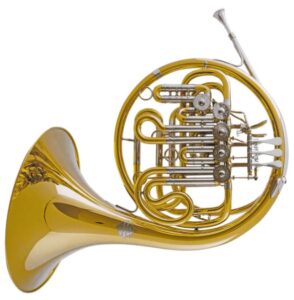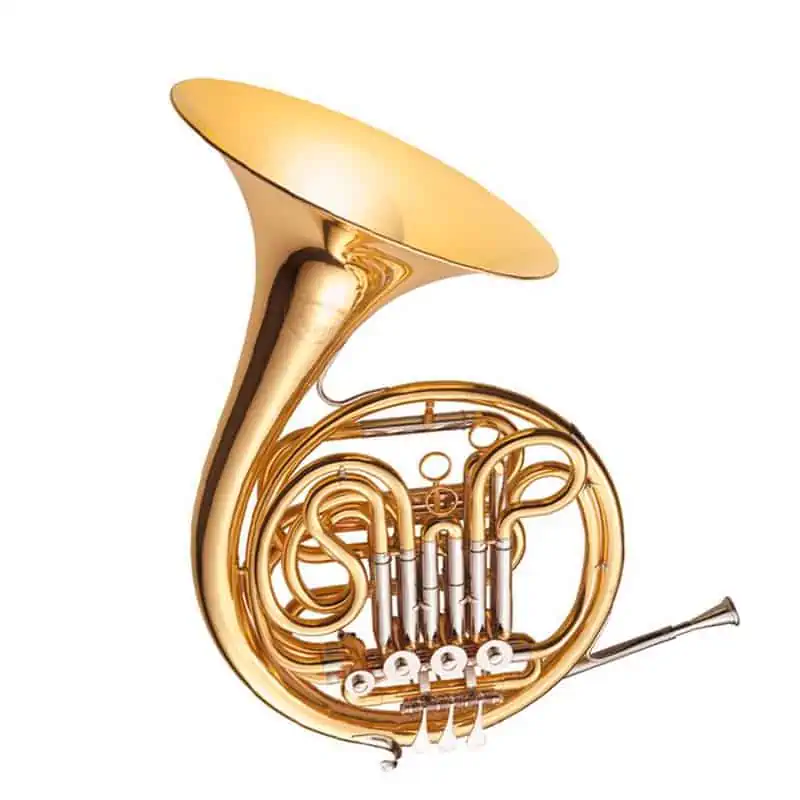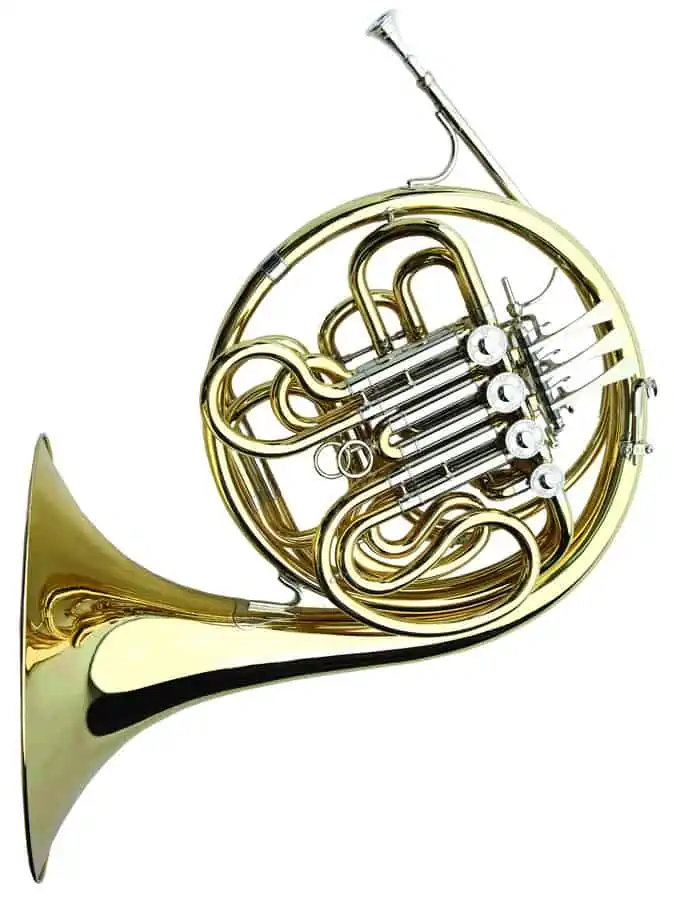Best
Beginner french horn
-
Overall: Excellent Horn for the Serious Student
-
Best Feature: Four Mechanical-Link Tapered Rotary Valves
-
TedScore™: 8.6/10
Best
OVERALL FRENCH HORN
-
Overall: Unmatched in Tone Quality and Intonation
-
Best Feature: Exclusive Tuning Slides
-
TedScore™: 9/10
Best
Intermediate Horn
-
Overall: Perfect Instrument for the Aspiring Professional
-
Best Feature: Geyer Style Wrap and High Quality Finish
-
TedScore™: 8.4/10
Know you want a horn but not sure which one to choose? This horn buying guide will help any musician find the best French horn for them.
Choosing an instrument is exciting, but it’s also important to get it right. Think of it as an investment – a good horn means it’ll be easier to play, meaning more fun and more progress!
I remember when I invested in a high-quality horn, and the difference in playability and enjoyment was remarkable. It truly made a difference in my progress and overall experience as a trombone player.
The horn is quite expensive for a brass instrument, but this French horn buying guide should point out some of the better-value instruments available.
For beginners, while our top 5 brands article will give you an idea of some specific french horn brands and models, here are some general things to look for. And for more advanced players, in addition to the basics, we have a list of things to consider if you’re trading up to another instrument.
Types of French Horn
Single horns
Single horns are horns in either F or B flat. F horns have a great, in-tune middle register, are the traditional key for the horn, and many teachers believe starting on the F horn teaches French horn players important values. Bb horns are easier to play high notes on, but are a less traditional choice for starting. Additionally, some of the low notes are hard to play on a Bb horn, and middle-register ones can be out of tune.

Not all of this will matter much to a beginner horn player, and it is possible to play well on a single F or single Bb. Additionally, single horns are the cheapest option, particularly if you don’t have the budget to invest £/$1500+.
Compensating horns
A compensating horn gives you the features of the double horn with slightly less weight and expense. They have less tubing than a double, hence the lightness, but not as many of them are made so it can be harder to find them. To non-professionals, they are almost exactly the same as full doubles – so, they are a great choice.
They can be a good option if you’re looking for something on a budget too, as prices tend to be cheaper than those for full doubles.

There is a Paxman Academy Compensator, around the same level as the Paxman Academy, or at the professional end there is the Paxman 33.
Double horns
A double French horn is a combination F and Bb horn, allowing the player to use a thumb valve (thumb key) to switch between them for different notes, thus keeping the best features of both horns. This is the ideal horn to have – although they are more expensive.
A double horn is an investment, however, making it far easier to play high and low on the instrument and often offering a better sound and a better build quality.

Student level instruments include the Jupiter 852L (one of the best beginner doubles), as well as the Paxman Academy. At the professional end there are horn models such as the Alexander 103 and the Paxman 20.
Things to consider when buying a horn
Material and whether lacquered or unlacquered
Although it matters less for players at beginner skill level (yellow brass is standard – plenty of pros play on yellow brass instruments!), different materials or metals can make a difference to the sound.
Gold brass is mellower than yellow brass, for example, and nickel silver is darker.
You can also opt for unlacquered or lacquered instruments – lacquer is a kind of varnish and keeps the horn shiny. Unlacquered can be lighter and more ringing, but lacquered French horns wear out more slowly, as well as avoiding you getting green hands from the reaction between sweat and metal. So a lacquer finish is largely a question of personal preference!

Bell/bore size
The majority of French horns on sale nowadays are medium or large bore, with small bore horns mostly being consigned to history. A larger bore will give a bigger, darker sound; critics might describe it as unfocused or woolly, but they can sound exciting and impressively massive in many situations!
However, generally speaking, unless you need a horn for a very specific situation (a particular orchestra where you have a job etc.), consider getting a French horn that’s medium bore and quite middle of the road. This allows you to fit in with a wide range of people without too much effort – a really important skill to have. And you’ll probably get told to “play quieter” a lot less with a smaller bell throat – not because large bore is loud, but just because the sound of a medium bore horn is more transparent.

Fixed or detachable bell
Some French horns have the bell chopped off and reattached using a screw thread. The main reason to do this is convenience – the horn will fit in a wider range of cases this way, and can be taken on planes. It is well worth it, although perhaps not necessary at the beginning of your playing career!
Detachable bells can also be switched around, allowing the player to find different combinations of bell and horn that they like.
Best French horn brands
ALL THE MODELS IN THIS SECTION ARE FULL DOUBLE FRENCH HORNS, ADVANCED LEVEL HORNS FOR ADVANCED LEVEL PLAYERS.
Best models of French horn

DESIGNED FOR: Professionals
COMES WITH: Full Double French Horn
FEATURES: Classic look
Alexander 103
When you check the price above, you’ll see there are loads of great places to buy this item. Our personal favorite is Gear4music.
It is the largest music retailer in the UK and fast becoming the most respected online music shop in the US too. Their customer service is excellent, they have competitive prices, really fast shipping, and usually have the longest guarantee.
Most professional musicians use Gear4music, so there is no reason why you shouldn’t too!
- Standard instrument in Europe/UK/US - easy to match other players with the same instrument
- Slow to get brassy - big beautiful sound
- Very free-blowing, easy to play
- Less common in Germany
- Harder to get brassy if that’s what you want
The professional musician who wrote this article combined many things,
from the product build, manufacturer’s reputation through to feedback
from other users, to create our famous TedScore™.
Another world-class horn, big-sounding and reliable
The Paxman 20 is a standard double horn, free-blowing and played by many British French horn players and in some European and US orchestras.
These trombones produce a rich, resonant sound that develops gradually, allowing for a smooth transition to a brassy tone. The design effectively addresses common issues in the high and low registers, resulting in a more balanced and accurate performance. These features have proven to be incredibly handy in my experience with the instrument.
The number of symphony orchestras that play on Paxmans is testament to the fact they project well, although for my ears, Alexander horns have greater definition and clarity of sound in dense orchestral pieces (a matter of taste – I know some die-hard Paxmanites think Alexanders sound nasal!).
They have a slightly larger bore than Alexanders, which makes them more free-blowing. And they’re a very consistent make, so every Paxman 20 is high-quality.

DESIGNED FOR: Professional Players
COMES WITH: Nickel silver valve casings
FEATURES: Hand stopping 5th Valve (By Request)
Paxman 20
When you check the price above, you’ll see there are loads of great places to buy this item. Our personal favorite is Gear4music.
It is the largest music retailer in the UK and fast becoming the most respected online music shop in the US too. Their customer service is excellent, they have competitive prices, really fast shipping, and usually have the longest guarantee.
Most professional musicians use Gear4music, so there is no reason why you shouldn’t too!
- It has a Merewether System
- Available in Medium, Europa and Large sizes
- Easy to Play in All Registers
- More expensive than the Alexander 103
The professional musician who wrote this article combined many things,
from the product build, manufacturer’s reputation through to feedback
from other users, to create our famous TedScore™.
Halfway between the Alex 103 and the Paxman 20
Halfway between the Alex 103 and the Paxman 20, a free-blowing high-quality professional instrument.
The 1103 is like a cross between an Alex 103 and a Paxman 20. It has the lovely sound clarity of a 103 but is slightly freer-blowing (like a Paxman) as a slightly wider-bored horn. They are even more expensive than the 103, but are amazing instruments.

DESIGNED FOR: Professionals
COMES WITH: Full double French Horn
FEATURES: Full Double French Horn and classic look
Alexander 1103
When you check the price above, you’ll see there are loads of great places to buy this item. Our personal favorite is Gear4music.
It is the largest music retailer in the UK and fast becoming the most respected online music shop in the US too. Their customer service is excellent, they have competitive prices, really fast shipping, and usually have the longest guarantee.
Most professional musicians use Gear4music, so there is no reason why you shouldn’t too!
- Standard instrument in Europe/UK - blends with Alexanders & Paxmans
- Beautiful sound that carries and projects but freer blowing than the 103
- Good compromise between an Alex 103 and a Paxman
- Lots of options (different metals, lacquer, garland, detachable bell etc.)
- Professional-level instrument
- More expensive than the 103; also priced in €, so exchange rate dependent
- Less common in US professional orchestras
- Renownedly inconsistent - check them really thoroughly before you buy
- Not stocked everywhere
- 2nd-hand 1103s are rare
The professional musician who wrote this article combined many things,
from the product build, manufacturer’s reputation through to feedback
from other users, to create our famous TedScore™.
Best brands of French horn for a beginner
THE HORNS COVERED IN THIS SECTION ARE MORE ON THE SIDE OF STUDENT HORNS – FRENCH HORNS YOU MIGHT BUY ON A BUDGET!
Best models of French horn for a beginner

DESIGNED FOR: Intermediate (or beginner who wants to invest)
COMES WITH: Full double French Horn
FEATURES: The best-value intermediate instrument money can buy - a rare but special find
Jupiter 852L
When you check the price above, you’ll see there are loads of great places to buy this item. Our personal favorite is Gear4music.
It is the largest music retailer in the UK and fast becoming the most respected online music shop in the US too. Their customer service is excellent, they have competitive prices, really fast shipping, and usually have the longest guarantee.
Most professional musicians use Gear4music, so there is no reason why you shouldn’t too!
- In tune
- Sturdy
- Double horn
- Bargain price for an intermediate instrument, great value
- Hard to find
- Good sound, but not as much depth as a professional instrument
The professional musician who wrote this article combined many things,
from the product build, manufacturer’s reputation through to feedback
from other users, to create our famous TedScore™.
A fantastic student instrument that can take the player far
The Paxman Academy series full double is an intermediate instrument that can last young players right up until 18, and beyond if they’re not going to go into the profession (it’s also a great buy for adult learners who can’t afford an expensive professional French Horn but still want something good-quality). It’s well in tune with a good tone, and Paxman also rent them out

DESIGNED FOR: Intermediate (or beginner who wants to invest)
COMES WITH: Full double French Horn
FEATURES: A fantastic student instrument that can take the player far.
Paxman Academy
When you check the price above, you’ll see there are loads of great places to buy this item. Our personal favorite is Gear4music.
It is the largest music retailer in the UK and fast becoming the most respected online music shop in the US too. Their customer service is excellent, they have competitive prices, really fast shipping, and usually have the longest guarantee.
Most professional musicians use Gear4music, so there is no reason why you shouldn’t too!
- In tune
- Sturdy
- Double horn
- Bargain price for an intermediate instrument, great value
- Still not a professional instrument
- Sturdy, but not totally indestructible
The professional musician who wrote this article combined many things,
from the product build, manufacturer’s reputation through to feedback
from other users, to create our famous TedScore™.

DESIGNED FOR: Intermediate
COMES WITH: Full double French Horn
FEATURES: A fantastic student instrument that can take the player far.
John Packer JP161
When you check the price above, you’ll see there are loads of great places to buy this item. Our personal favorite is Gear4music.
It is the largest music retailer in the UK and fast becoming the most respected online music shop in the US too. Their customer service is excellent, they have competitive prices, really fast shipping, and usually have the longest guarantee.
Most professional musicians use Gear4music, so there is no reason why you shouldn’t too!
- Work well
- Very light
- Sturdy
- Child-sized
- Bargain
- Single horn
- Not suitable for adults
- Strictly for beginners
The professional musician who wrote this article combined many things,
from the product build, manufacturer’s reputation through to feedback
from other users, to create our famous TedScore™.
John Packer make bargain beginner student horns – single French horns in F and Bb (see this article – I wrote something about this in one of my articles for info on the Bb vs F single horn debate) in a standard yellow brass finish. They work well, and they’re very light, sturdy and suitably small for young hands – and the cheapest good beginner single French Horns money can buy.
For more options, check out our beginner horn buying guide.
New v used French horn
For many things, used is better than new – but not necessarily so for French horns!
As long as a second hand instrument isn’t too dented, it takes a really long time to wear a French horn out. That said, sometimes it can be easier to get hold of new instruments if you’re looking for a beginner instrument (a lot of the second-hand market is professional instruments).

With dents, it’s good to check they’re not too close to the mouthpiece. Bell dents: probably fine, mouthpipe dents and dents close to that end: not so fine.
However, try not to buy a French horn that “might” be good but needs doing up! Sometimes instruments with one obvious flaw need a lot of other things fixing – and you don’t want to end up spending hundreds of pounds on repair only to discover there are still fundamental things wrong.
Accessories for your horn
We’ve written a whole other article discussing accessories for brass players, which you can find here. It covers mouthpieces, cases and a range of playing gadgets you might be interested in.
Hire and assisted purchase schemes
It’s always worth looking around to see if there are ways that you can get assistance with buying your instrument. These opportunities are mostly available to students.
A number of charities operate in the US and are only a quick websearch away (many schools will also have instruments to loan out, or band programmes). Large music companies offer assistance, such as Yamaha and the EMI Music Sound Foundation. Help Musicians UK also offer a “Funding Wizard” which you can search.
In the UK, there are a number of schemes which allow you to buy your choice of instrument minus the tax. Schools, for example, can back the “Take It Away” Scheme (where they effectively purchase the instrument at a discount.
It’s always worth looking around for savings – if you don’t ask for money, you don’t get it, so an application to a charity or scheme is always worth a try.
French horn buyer's guide
Summary
One of the best French horn brands is Conn-Selmer. But there are many quality horns available, and what you need might differ according to your level.
Single horns are best for small children; a double might suit an adult better. Paxman and Alexander horns are professional level but come with the price tag to match.
You can also find your ideal sound by choosing different metals, or make the horn more convenient by going for a detachable-bell instrument.
Whatever your level, there are options to consider – good luck with finding your ideal instrument
FAQ's
It depends on the horn! Relatively new horns will only depreciate 25% but used horns can be half-price or less, depending on the condition. So a beginner used horn might be £100-200, but a professional used horn you might be looking at more like £4000 or £5000.
Really good (new) professional instruments start at £6000 – but a good student instrument can be yours from £1500 up. A good second-hand professional instrument would be £4000+.
The best thing to do is to go and play several at a horn shop. See what you like best! Generally it’s best to go for something not too extreme (not too big or too small, not too dark or too bright a sound) and to avoid instruments that seem like fixer-uppers – they often have hidden flaws that can be expensive to fix. And if you can, ask colleagues or a teacher to recommend you some brands to start with – and if you’re unsure, try to take someone with you to get a second opinion.
18 feet! Good job it’s coiled up after all…
The English horn is a woodwind instrument that is similar to the oboe but has a longer and curved body. It is commonly used in orchestral music and has a rich, warm tone.
The French horn is a brass instrument that is typically around 22 inches in length. It has a flared bell and a coiled tubing that can be up to 12 feet long.











Wonderful article and much food for thought. What is a good, solid, choice for a 66 year old beginner who has only played trumpet/cornet? Serious inquiry.
I don’t get why anyone would opt for a used French horn when there’s plenty of affordable new ones. Like, you never know what you’re getting with used stuff. Seems risky. Plus, new horns come with warranties and stuff, right? Anyone else think it’s better to just save up a bit more and go new?
Actually, DannyBoy78, some of the best horns are those with a bit of history. Sure, there’s a risk, but with proper research and maybe a trusted technician, you can find gems.
There’s a valid point in preferring new instruments for their warranty and pristine condition. However, the value of used horns, especially for beginners or intermediate players, shouldn’t be underestimated. They often offer higher quality at a lower price point. Always ensure to have any used instrument checked by a professional before purchase.
I must commend you, Gemma , on such a thorough guide for potential French horn buyers. It’s refreshing to see both the mechanical and aesthetic aspects of the instrument being discussed with equal importance. As someone who has spent decades in music education, I assure prospective buyers that understanding the nuances between single and double horns, as well as bell types, is crucial to making a satisfying purchase. This article serves as an excellent reference.
Imagine going to buy a French horn and coming back with a tuba cause it sounded bigger and better, lmao. Happened to a friend. No, really.
hey Gemma , quick q about the single horns. do they really make a good start for beginners? i’ve heard mixed things and am kinda torn. worth the investment or should i jump straight to a double horn? cheers!
I’d suggest trying both in a shop if possible, Alex. It really boils down to what feels right for you.
Hey Alex, Marty here. Definitely start with a single if you’re new. They’re lighter and easier to handle. Once you’re comfortable, consider upgrading.